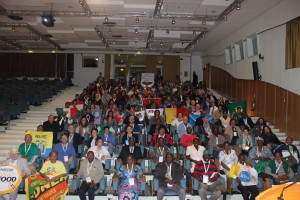The World in Crisis: Synthesis of the First Working Day of the World Meeting of Popular Movements

 Rome, October 27th, 2014
Rome, October 27th, 2014
Inspired by the contributions of the Italian political activist Antonio Gramsci, on the basis of a pessimistic analysis and an optimistic approach to action, we made the following observations:
- National and international Capital has launched an offensive to take over and privatise natural resources (Biodiversity, Water, Oxygen etc.) This offensive is mainly focused on mining installations and hydro-electric and nuclear power plants, all of which cause very serious problems – such as the destruction of the biomass, climate change, and evictions – as well as impinging directly upon the sovereignty of countries and of peoples.
- Seeds have been privatised and turned into commodities. Genetically modified plants, together with their accompanying toxic chemical inputs that poison and kill our peoples and the natural world, have been forced upon us.
- There is a climate crisis which is causing droughts, floods, hurricanes, fires, water shortages and an infinite number of problems which have already altered the conditions of life on our planet, affecting above all those who are poorest – nearly three billion people in the world.
- There is an energy crisis with the failure of the current energy matrix based on fossil fuels (Oil, Fracking, Gas, Coal and Charcoal). This crisis will worsen in the next 30 years.
- There is a food crisis in which food, the source of our life and the reproduction of humanity, has been commodified and standardised. The world food system is dominated by just 50 transnational companies. As a consequence of this crisis, nine million people in the world are suffering from hunger and the food security of the world’s peoples is threatened.
- There is increasing insecurity of employment, with expansion of the informal sector. There is a constant rise in worker productivity and lengthening of working hours, then more exploitation and more capital accumulation. Meanwhile, there are increasing attacks on workers’ rights. Furthermore, in most countries unemployment is rising each year, especially among the young – in some countries 50% of the young are unemployed. Capitalist profits rule, without limits.
- There are also growing numbers of people working in conditions of slavery or who are subjected to enforced prostitution or forced migration, and in some countries there has been an increase in cases of genocide perpetrated by drug-trafficking “mafias”. All of these are crimes against humanity.
- Land ownership, wealth, urban property, the communications media and political wealth are increasingly concentrated in the hands of a minority of capitalists who represent no more than 1% of the world’s population, 737 corporations, 80% of the financial sector, 147 transnational companies that are equal to 40% of the world’s wealth. In general, dominated by financial capital. Inequality is blatant: 70% of the world’s population has only 2.9% of its wealth.
- The United States imperial order and its allies in the G8 and the WTO control the world economy through the power of the dollar and free trade agreements (FTAs). By means of the machinery of War and control of the communications media, they impose their own self-interest on humanity in general.
- The wars that are now being waged are stupid and unacceptable and they are causing the loss of millions of innocent lives. They respond to the economic, geopolitical and energy interests of the imperialist countries, although those countries often use the false pretexts of ethnicity, religion or the “war against terror”.
- The international organisations are not democratic; they do not have popular representation; and they do not succeed in presenting real solutions for people’s problems.
- In the majority of countries, there are no democratic processes even when there are elections; citizens do not have the right to participate in political power in an effective manner.
- Government policies either do not give priority to the needs of the poorest or they are limited to palliative measures that do not succeed in getting to the root causes of the problems.
- Large cities are becoming real infernos. Real estate speculation and the control of urban space – just for profit, lead to an increase in slum neighbourhoods and to a lack of real citizenship for the majority of the population. Individual transportation is given priority over public transportation through the use of individually-owned cars that only serve the interests of the transnational automobile companies.
- The poor, their leaders, and social movements are the targets of acts of institutionalised violence perpetrated by paramilitary groups, drug-traffickers, and corrupt police forces.
- In the majority of countries there is not an independent (republican) judiciary. The judicial branch functions as an instrument for the defence of capitalist interests, legalising violence and the persecution of workers.
- There is more widespread discrimination against women, young people, and persons of African descent. Discrimination on the basis of religion, ethnic origin, and sexual orientation has particularly increased.
- Capitalist interests have monopoly control over the communications media, and they use this for financial profit and as a tool for ideological control over the minds of the people.
- Academia and Science have been manipulated. Rather than serving the needs of the population, they have been used only to increase productivity and profits for the benefit of Capital.
- Culture has become increasingly commodified, defending the spurious values of consumerism, egoism, and individualism. At the same time, the working class is suffering from a crisis in its Social Project.
- Unfortunately, popular organisations are still weak and have much difficulty in taking action. We are alas in a historical period in which the mass movement is waning. Social struggles are in a phase of “protest”, rather than being directed towards the construction of a social project that involves working people and that is based on solidarity, equality, and – especially – justice. For justice is the foundation of stability; without justice there is no future.
